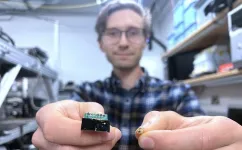(Press-News.org) AI will soon receive a dose of empathy with the goal of helping to match people with depression to their best-fit medication. A team led by Farrokh Alemi, a professor in the College of Public Health (CPH), and Kevin Lybarger, an assistant professor in the College of Engineering and Computing (CEC), received $1,049,998 in research funding from the Patient-Centered Outcomes Research Institute (PCORI) to continue their work on developing an AI system that helps patients find the right depression medications.
With this funding support, Co-PIs Alemi and Lybarger will hone large language models (LLMs) to address known challenges in AI, including mitigating biases, reducing the potential for inaccurate information, and incorporating an empathetic tone, according to Alemi.
The new study will introduce an innovative way for AI to help patients make medication decisions. The AI system will engage patients in natural-language conversations to collect information about their medical history. The system will draw upon more than 10 million patient experiences with 15 different oral antidepressants and a National Institutes of Health All of Us database, which includes records from more than 80,000 participants with major depressive disorders, to help create a plan that is statistically likely to succeed. Alemi and Lybarger believe this will help alleviate the trial and error that can lead to negative patient outcomes.
The researchers will also introduce a first-of-its-kind patient simulator capable of mimicking various medical, linguistic, and behavioral characteristics. This simulator will be used to test and refine the AI system by simulating diverse patient scenarios, including infrequent but critical events such as suicidal ideation, to ensure the system’s recommendations are safe, culturally sensitive, and empathetic.
“This study was selected for its potential to address a high-priority methodological gap in patient-centered comparative clinical effectiveness research,” said PCORI Executive Director Nakela L. Cook. “We look forward to following the study’s progress and working with George Mason to share the results.”
This is the first PCORI-funded study that George Mason has received. “Depression is a major public health problem and we are excited to see the development of new AI-based decision tools, leveraging the multidisciplinary talents of our college to help tackle it,” said CPH Associate Dean of Research Alison Cuellar.
"This innovative study promises to generate methodologies for using AI for medical decision-support and for empowering patients to make critical health decisions beyond mental health,” says Özlem Uzuner, chair of CEC’s Department of Information Sciences and Technology.
This study is one of the latest funded by PCORI to examine which medical treatments work best, where and when treatment falls flat, and how to address the gaps. These studies deliver results that guide researchers in planning future studies and provide patients, their caregivers, and clinicians with the evidence-based information needed to make better-informed health and health care decisions.
END
Interprofessional George Mason researchers awarded more than $1 million to improve outcomes for patients with depression
Patient-Centered Outcomes Research Institute (PCORI) award funding; will develop innovative Artificial Intelligence (AI) technology for improving antidepressant recommendations.
2024-12-12
ELSE PRESS RELEASES FROM THIS DATE:
Illinois historian says Midwest played a crucial role in Black freedom movements worldwide
2024-12-12
CHAMPAIGN, Ill. — The Midwest played a central role in the growth of Black freedom movements in the 20th century. It was a key site for incubating and expanding the ideas of political activist Marcus Garvey, not only in the U.S., but globally, said University of Illinois Urbana-Champaign professor of African American studies and history Erik S. McDuffie.
McDuffie examined the influence of Garvey and the importance of the Midwest in the growth of Black internationalism and radicalism in his new book, “The Second Battle for Africa: Garveyism, the U.S. Heartland and Global Black Freedom.”
McDuffie ...
New research finds how fighting female flies focus on their foes
2024-12-12
In most research labs, the scientists are on the same page about why they’re pursuing a research project.
But the Rubin Lab at HHMI's Janelia Research Campus isn’t an ordinary research lab.
The lab is examining how aggression affects vision in female fruit flies, but Janelia Senior Group Leader Gerry Rubin doesn’t care too much about the specific answer. Instead, he simply wants to see if the neuroscience research tools that he spent the last decade building are adequate to uncover the underlying mechanisms at play.
Postdoc Katie Schretter, on the other hand, is interested in understanding how neurons in the fly brain ...
University of Houston students address energy poverty, shine in global competition
2024-12-12
HOUSTON, Dec. 12 2024 – A group of ambitious students from the University of Houston and Texas A&M University, identifying as the “Dream Team,” secured third place in the prestigious global Switch Competition. This annual virtual event, sponsored by the Switch Energy Alliance, challenges university students to develop innovative solutions for addressing energy poverty worldwide — a critical issue affecting millions.
The team is comprised of Sarah Grace Kimberly and Pranjal Sheth, both senior finance majors at UH, and Nathan Hazlett, a finance graduate student at A&M who previously earned a bachelor’s degree in petroleum engineering. Competing ...
Bringing the power of tabletop precision lasers for quantum science to the chip scale
2024-12-12
For experiments that require ultra-precise measurements and control over atoms — think two-photon atomic clocks, cold-atom interferometer sensors and quantum gates — lasers are the technology of choice, the more spectrally pure (emitting a single color/frequency), the better. Conventional lab-scale laser technology currently achieves this ultra low-noise, stable light via bulky, costly tabletop systems designed to generate, harness and emit photons within a narrow spectral range.
But what if these atomic applications ...
New study finds overfishing has halved shark and ray populations since 1970
2024-12-12
A new analysis published in the journal Science reveals that overfishing has caused populations of chondrichthyan fishes – sharks, rays, and chimaeras – to decline by more than 50 per cent since 1970. To determine the consequences, a team of researchers developed an aquatic Red List Index (RLI) which shows that the risk of extinction for chondrichthyan has increased by 19 per cent. The study also highlights that the overfishing of the largest species in nearshore and pelagic habitats could eliminate up to 22 per cent of ...
Study shows American College of Lifestyle Medicine education initiative improves clinicians’ ability to make lifestyle and dietary interventions
2024-12-12
Clinicians who completed an American College of Lifestyle Medicine (ACLM) course introducing the foundations of lifestyle medicine and food as medicine reported significant improvements in their knowledge and confidence, as well as increases in how often they practice lifestyle medicine with patients, a research study found.
The findings are important because, while lifestyle behavior changes are often the optimal treatment option in clinical practice guidelines for noncommunicable chronic diseases, many clinicians cite their lack of knowledge and training in lifestyle behavior interventions as a barrier. A growing body of evidence supports the ...
Researchers succeed in controlling quantum states in a new energy range
2024-12-12
An international team of scientists headed by Dr. Lukas Bruder, junior research group leader at the Institute of Physics, University of Freiburg, has succeeded in producing and directly controlling hybrid electron-photon quantum states in helium atoms. To this end, they generated specially prepared, highly intense extreme ultraviolet light pulses using the FERMI free electron laser in Trieste, Italy. The researchers achieved control of the hybrid quantum states using a new laser pulse-shaping technique. Their results have ...
Do animals get jealous like people? Researchers say it’s complicated.
2024-12-12
It’s a question that has puzzled thinkers for centuries: Are we humans alone in our pursuit of fairness and the frustration we feel when others get what we want?
In recent years, evolutionary psychologists have suggested that we’re not all that special. Animals, from corvids to capuchin monkeys, express what humans might recognize as jealousy when, for example, they are passed over for a sought-after snack. Many argue this is evidence we are not alone in our aversion toward unfairness.
But new research from the University of California, Berkeley, makes the case that humans might be unique after all.
Using data from ...
Social risks impede cancer screening, even with access to care
2024-12-12
Researchers at University of California San Diego and collaborating institutions have shed light on the ways that social risks, such as housing or food insecurity, pose barriers to routine cancer screenings. The study, published in JNCI Cancer Spectrum, found that patients experiencing social risks were less likely to receive orders for cancer screenings and even less likely to complete screenings when ordered. The study also found that patients experiencing social risks had higher rates of primary care ...
Examining gender inequality in academic publishing
2024-12-12
Editors of academic journals hold an influential position in their field. They have decision-making power over which authors and papers get published, set journal policy, and help shape the trajectory of their discipline. It is also a role in which women are frequently underrepresented.
Assistant professor of accounting Sebastian Tideman-Frappart and several colleagues set out to fill a knowledge gap about this issue in the field of management science by tracking gender diversity in world-leading management journals over time. The resulting article – co-authored by Brooke Gazdag, associate professor of management at Kühne Logistics University; Jamie Gloor, assistant professor ...
LAST 30 PRESS RELEASES:
ASU researchers to lead AAAS panel on water insecurity in the United States
ASU professor Anne Stone to present at AAAS Conference in Phoenix on ancient origins of modern disease
Proposals for exploring viruses and skin as the next experimental quantum frontiers share US$30,000 science award
ASU researchers showcase scalable tech solutions for older adults living alone with cognitive decline at AAAS 2026
Scientists identify smooth regional trends in fruit fly survival strategies
Antipathy toward snakes? Your parents likely talked you into that at an early age
Sylvester Cancer Tip Sheet for Feb. 2026
Online exposure to medical misinformation concentrated among older adults
Telehealth improves access to genetic services for adult survivors of childhood cancers
Outdated mortality benchmarks risk missing early signs of famine and delay recognizing mass starvation
Newly discovered bacterium converts carbon dioxide into chemicals using electricity
Flipping and reversing mini-proteins could improve disease treatment
Scientists reveal major hidden source of atmospheric nitrogen pollution in fragile lake basin
Biochar emerges as a powerful tool for soil carbon neutrality and climate mitigation
Tiny cell messengers show big promise for safer protein and gene delivery
AMS releases statement regarding the decision to rescind EPA’s 2009 Endangerment Finding
Parents’ alcohol and drug use influences their children’s consumption, research shows
Modular assembly of chiral nitrogen-bridged rings achieved by palladium-catalyzed diastereoselective and enantioselective cascade cyclization reactions
Promoting civic engagement
AMS Science Preview: Hurricane slowdown, school snow days
Deforestation in the Amazon raises the surface temperature by 3 °C during the dry season
Model more accurately maps the impact of frost on corn crops
How did humans develop sharp vision? Lab-grown retinas show likely answer
Sour grapes? Taste, experience of sour foods depends on individual consumer
At AAAS, professor Krystal Tsosie argues the future of science must be Indigenous-led
From the lab to the living room: Decoding Parkinson’s patients movements in the real world
Research advances in porous materials, as highlighted in the 2025 Nobel Prize in Chemistry
Sally C. Morton, executive vice president of ASU Knowledge Enterprise, presents a bold and practical framework for moving research from discovery to real-world impact
Biochemical parameters in patients with diabetic nephropathy versus individuals with diabetes alone, non-diabetic nephropathy, and healthy controls
Muscular strength and mortality in women ages 63 to 99
[Press-News.org] Interprofessional George Mason researchers awarded more than $1 million to improve outcomes for patients with depressionPatient-Centered Outcomes Research Institute (PCORI) award funding; will develop innovative Artificial Intelligence (AI) technology for improving antidepressant recommendations.




